Discipleship Council Report
Discipleship Council Report
We are blessed to be a connectional church; no church is an island unto itself but rather is connected in mission and ministry with other United Methodist churches, campus ministries, retreat & camping ministries and other entities. One structural aspect that the Baltimore-Washington Conference adopted in 2006 was the Discipleship Council which serves some of the functions that a local church’s Church Council plays.
The Discipleship Council: (a) functions, as necessary, on behalf of the Annual Conference in between sessions; (b) ensures that Conference resources align to our vision, mission, and critical issues; and (c) discerns, develops, reviews, and evaluates the strategic direction of the Conference toward its vision and goals. It coordinates and consults with the Conference Council on Finance and Administration regarding the annual budget.
We take seriously our responsibility to ensure that Conference resources align to its vision, mission, and critical issues; as we discern, develop, review, and evaluate the strategic direction of the Conference toward its vision and goals.
As we shared with you at the last Annual Conference Session, our goals for 2020 were three-fold:
- Increase by at least 10% per year the number of churches who are on a pathway to becoming an anti-racist church so that by 2022 all of our BWC churches are on a path toward becoming racial justice change agents.
- Each local church reports on its progress as related to the NEJ Call to Action on Racial Justice and on its internal and external conversations annually at church/charge conference with 10% more churches engaged than the year before so that by 2026 100% of our churches are doing work to grow in our Intercultural Competence Covenant (traits of Beloved Community) throughout the conference.
- Continue crystalizing our system for understanding ministry vitality.
Furthermore, we shared that our next step would happen during church conference season. The 2020 church profile included elements from the 2019 Pastor’s report and are directly related to the Discipleship Council’s work.
We would like to share this data with you, as we have with individual discipleship board chairs.
We continue to reclaim our Wesleyan discipleship even as we respond to the changing ministry and social landscape. John Wesley’s Rule of Discipleship provides a holistic understanding of discipleship: “to witness to Jesus Christ in the world and to follow His teachings through acts of compassion, justice, worship and devotion under the guidance of the Holy Spirit.”
Within this context, churches were asked to rate each dimension.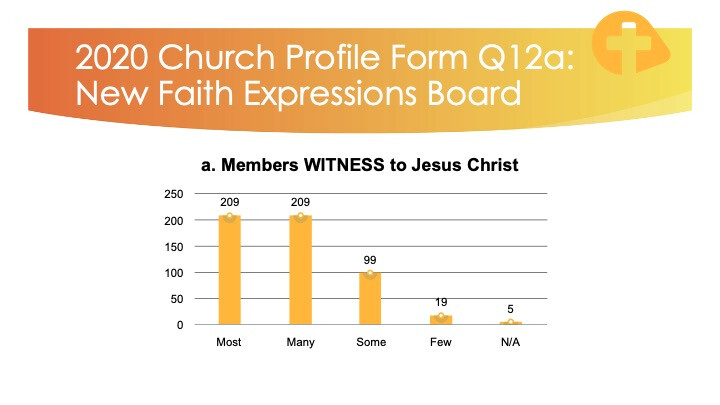
On this and each of the following slides you will see the question number from the 2020 Church Profile Form and the Discipleship Agency to which it relates.
418 churches reported that most or many of their members witness to Jesus Christ. 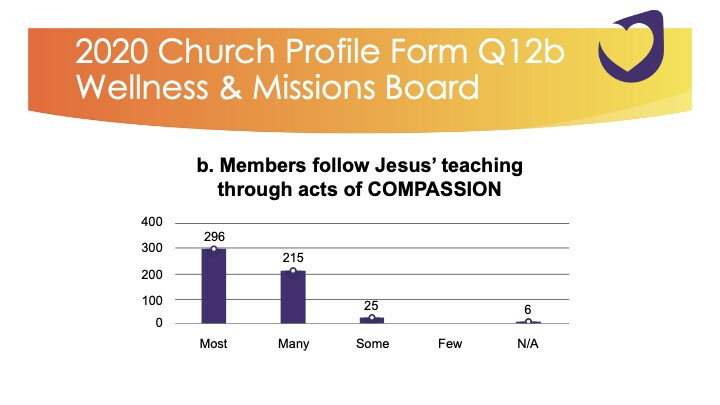
511 churches reported that most or many members follow Jesus’ teaching through acts of Compassion.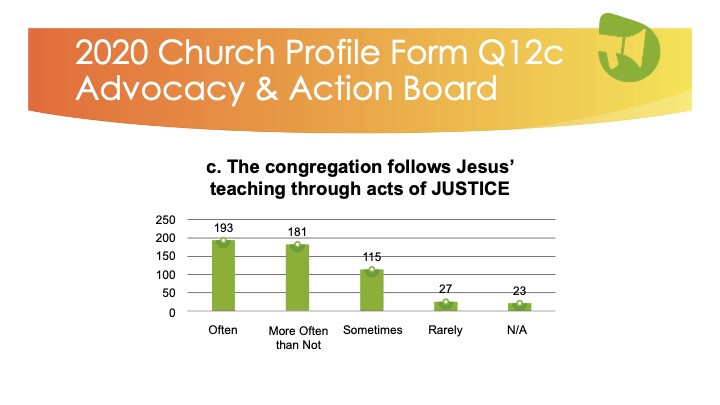
374 churches reported that the congregation follows Jesus’ teaching through acts of Justice often or more often than not.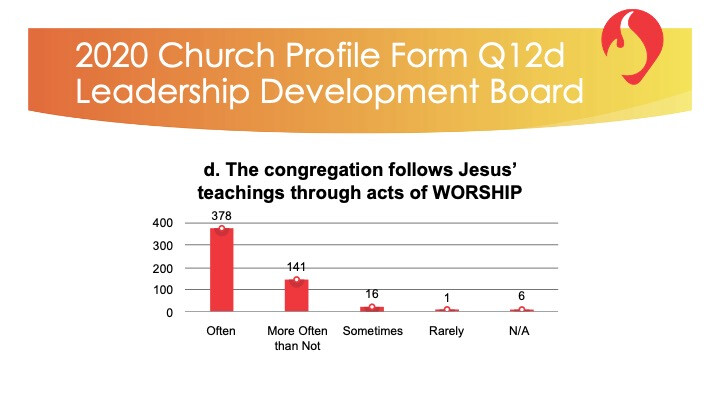
519 churches reported that the congregation follows Jesus’ teachings through acts of Worship often or more often than not.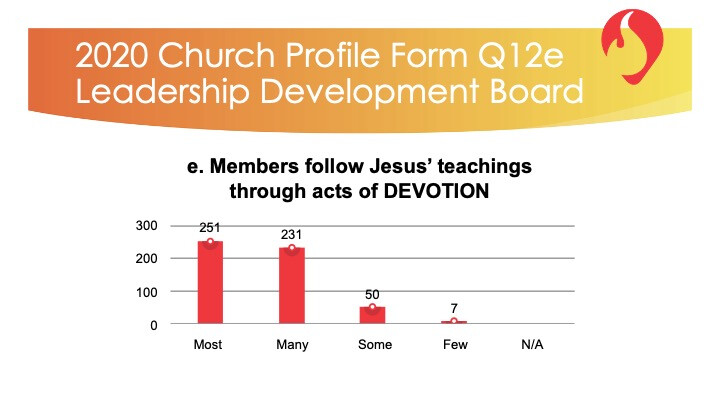
482 churches reported that most or many members follow Jesus’ teaching through acts of Devotion.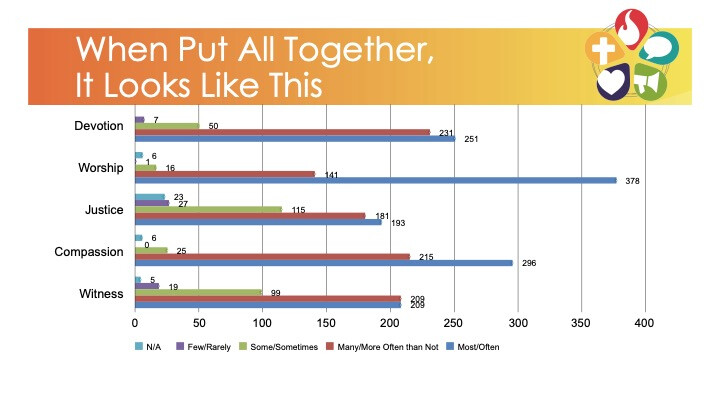
In this chart, the
- dark blue means most,
- red means many,
- green means some,
- purple means few, and
- bright blue means not applicable.
When the Discipleship Council looked at all five aspects, we couldn’t help but notice an unevenness and that justice wasn’t a spiritual discipline for most of our congregations.
Yet justice is a spiritual discipline. It is the way that we can love God and neighbor together. It is vital that we reclaim the spiritual discipline of justice as a part of our understanding of discipleship and congregational vitality.
Furthermore, it is important that we do this to live into our commitments to the NEJ Call to Action and our UM Constitution:
On the 2020 Church Profile form, we invited congregations to tell us where the congregation is on the path toward racial justice. People could -- and did -- select more than one response.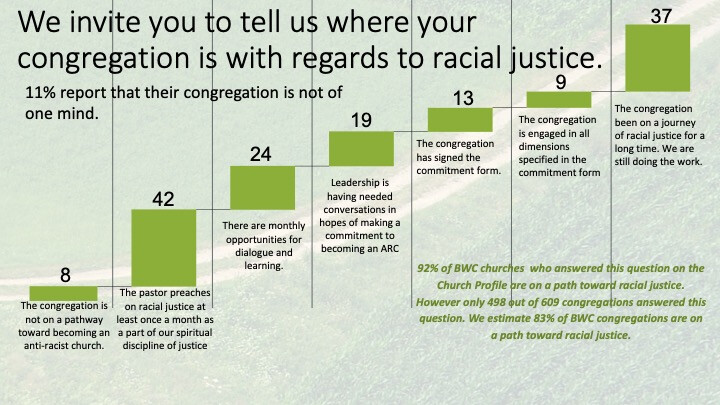
Of the 498 churches that answered this question,
- 8% reported that the congregation is not on a pathway toward becoming an antiracist church.
- 42% reported that the pastor preaches on racial justice at least once a month as a part of our spiritual discipline of justice for all God’s people.
- 24% reported that there are monthly opportunities for dialogue and learning.
- 19% reported Leadership is having needed conversations in hopes of being able to meaningfully sign the commitment form.
- 13% reported that the congregation has signed the commitment form.
- 9% reported that the congregation is engaged in all dimensions specified in the commitment form.
- 37% reported that our congregation has been on a journey of racial justice for a long time. We are still doing the work.
We celebrate that 83% of BWC congregations are on a path toward racial justice.
We also look forward to seeing how this baseline number grows when we receive results from the 2021 Discipleship Ministries form.
As you look at this slide, please note that congregations could choose more than one answer and 11% of our congregations are not of one mind.,
One of the Discipleship Council’s roles is to keep this on the dashboard, ensuring the Conference is providing adequate support for congregations to do this work and that the appropriate Conference groups are helping lead and resource, monitoring progress on the We Rise United project.
We have learned a lot from working with the individuals and churches who have committed to becoming an antiracist church.
The Racial Justice Team has formed three working groups in partnership with the Legislative Action Team, Black Methodists for Church Renewal, and Hispanic/Latino Ministries leadership as a result of our work with those who have signed the Commitment to Becoming an Antiracist Church. Those working groups meet regularly and include "How to Get Started and/or Get More Folks Involved in Becoming an Antiracist Church for Beloved Community,” "How to be a Catalyst for Change in a Congregation,” and "Working on Legislation and Policy for Change."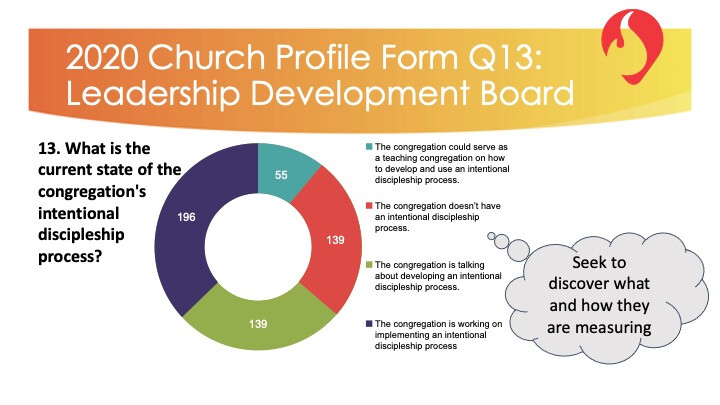
Deepening discipleship continues to be at the heart of all that we do. This chart illustrates the status of local congregations in the development of an intentional discipleship process. This information helps the Discipleship Council to know how to align Annual Conference resources to support local congregations to increase their capacity for making and maturing disciples.
We celebrate the number of persons reporting that congregations are:
- talking about implementing an intentional discipleship process (139)
- working on implementing an intentional discipleship process (196)
- identified as able to serve as a teaching congregation to develop and use an intentional discipleship process. (55)
We celebrate this information as it affirms for us that in the midst of uncertain and challenging times within the life of our denomination, congregations within our annual conference are remaining focused on one of the core tenets of our faith – Wesleyan discipleship.
We also recognize the need for supporting those congregations that have not yet implemented an intentional discipleship process. We hope to learn more about the factors that may prevent them from focusing on discipleship as these factors may also impact overall ministry vitality. 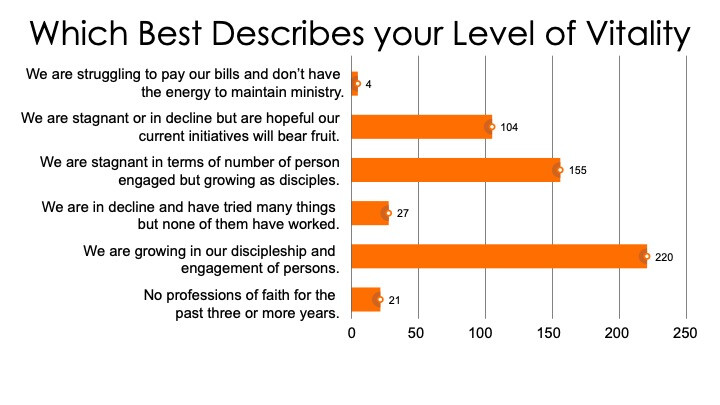
Effectively measuring ministry vitality remains of critical importance and we celebrate the number of persons reporting that congregations are:
- Growing in their discipleship and engagement of persons (220) and
- Growing as disciples although experiencing stagnation in the number of persons engaged (155).
In reviewing this information, Discipleship Council also could see that an intentional and ongoing focus on discipleship--especially in seeing all the people -- needs to be an essential part of resourcing congregations who aren’t experiencing fruit. 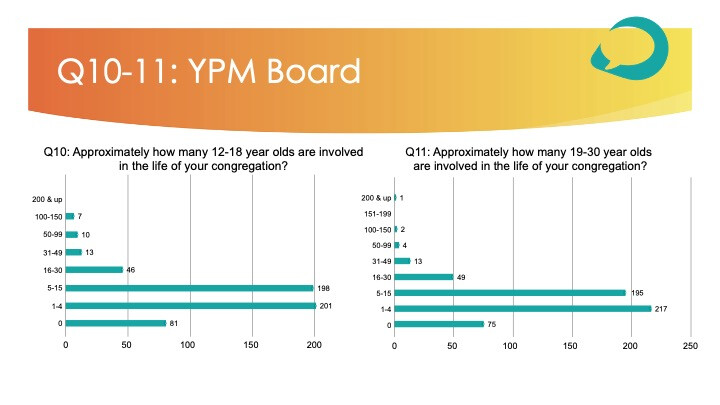
Finally, we have on our dashboard a Young People’s Ministries Strategic Goal of Growing Local Church Youth Engagement. We will track this by comparing this data year over year and seeing if the number of youth and young adults engaged in their churches increases year over year.
We don’t have comparisons between 2019 and 2020 because we just started collecting it in 2020.
This question and the previous ones are a part of the new Discipleship Ministries Form which is being used during this church conference season. We celebrate its focus and the fact that it is on the Church Conference Agenda.
All of the data gathered from the Pastor’s Reports and from the Discipleships Boards inform our approach to the 2021 Goals. By the end of 2021/beginning of 2022 we hope to have witnessed: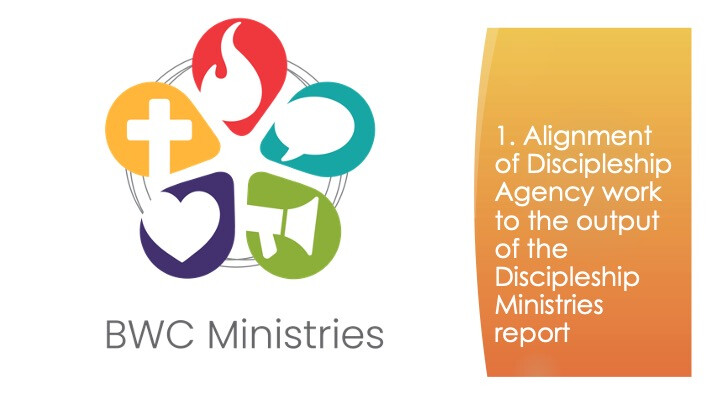
Continue to measure progress on board goals which are essential to the mission of inspiring and equipping local faith communities to make disciples of Jesus Christ for the transformation of the world. This year we will focus on the Alignment of Discipleship Board work to the output of the Discipleship Ministries report for greater Annual Conference impact.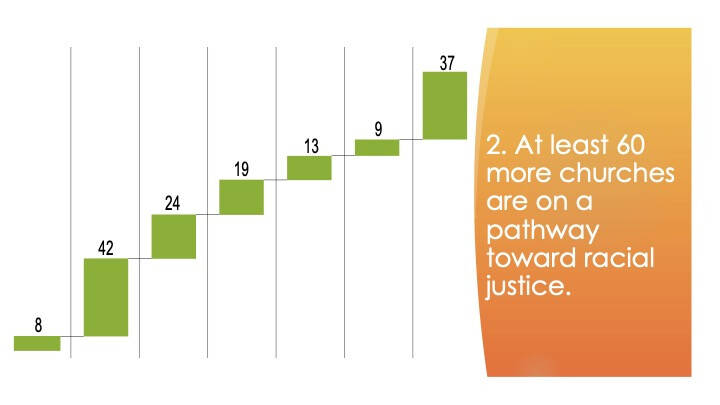
We see a 10% increase (at least 60 additional churches) in the number of churches that are on a pathway toward racial justice. Our work of antiracism is required for the creation of Beloved Community. It also requires practicing specific behaviors of intercultural competency, inclusion and equity. 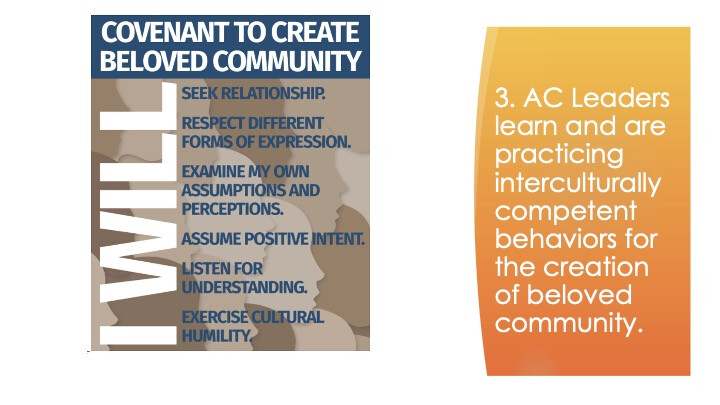
Our third goal is for Annual Conference Leaders (staff, district superintendents, district leaders, pastors, lay leaders and people serving on conference committees) to learn and practice interculturally competent behaviors for the creation of the Beloved Community.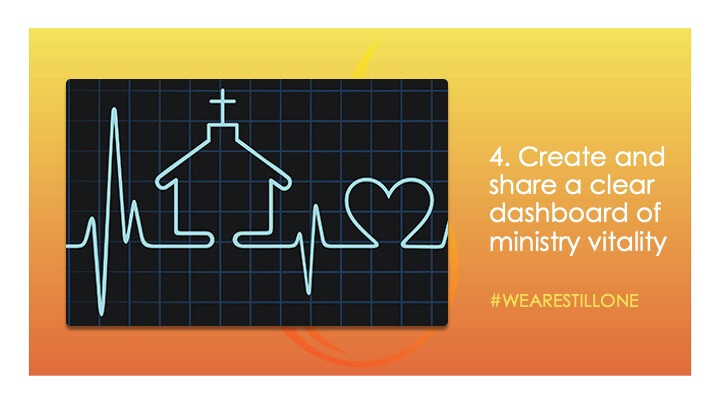
Creating a clear dashboard for Annual Conference Ministry with new strategic foci emerging from the work of the Discipleship Ministries boards and local churches.
As we continue to develop and refine this shared system of understanding, we will strengthen our ability to inspire and equip local faith communities to better develop disciples for the transformation of the world so that more transformed lives transform lives. And in so doing, witness to the fact that we are still one: standing, rising, transforming.
Rev. Jessica Hayden
Discipleship Council Chair
